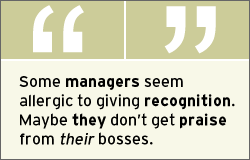Do you receive too much recognition at work?
Over the past year, I have posed this question to a few hundred people. And I have yet to hear a single "yes." Not one. So it's not surprising that a recent Gallup Poll found that almost two out of three people receive no workplace recognition in a given year.
 |
This underscores a recent finding from the U.S. Department of Labor that the number-one reason people leave their jobs has nothing to do with pay or promotions -- they leave because they "don't feel appreciated."
There are probably many reasons for this. Some managers seem allergic to giving recognition -- maybe they don't get praise from their bosses -- while others may simply prefer a "tough love" approach that equates praise with "softness." However, it's quite possible that people do get more recognition from their managers than they report -- but perhaps it's not meaningful enough to stick in their minds and make a difference.
Think about the greatest recognition you have ever received. Let this memory play out in your mind for a moment. Did this recognition make you more positive? More productive? Did it change the way you looked at your job?
Ask the right questions
Now, think about how you recognize your employees' great work. Do you provide them with the same recognition that you like to receive? If so, it's no wonder most of them feel underappreciated.
According to Gallup's latest analysis of 10,000 workgroups in 30 industries, when it comes to recognition, individualization is key. In order for recognition to be meaningful, it must be tailored to the recipient's preferences, not the giver's preferences. Many people prefer tangible rewards or gifts, while others are more moved by words and acknowledgement. And while some people want to receive kind words in front of a crowd, others prefer a quieter, one-to-one commendation or compliment from someone they admire or respect.
Not sure how to individualize recognition? Just ask your employees questions like these:
- By what name do you like to be called?
- What are your "hot buttons" -- hobbies or interests you like to talk about a lot?
- What increases your positive emotion or "fills your bucket" the most?
- From whom do you most like to receive recognition or praise?
- What type of recognition or praise do you like best? Do you like public, private, written, verbal, or other kinds of recognition?
- What form of recognition motivates you the most? Do you like gift certificates, a title for winning a competition, a meaningful note or e-mail, or something else?
- What is the greatest recognition you have ever received?
In addition to being individualized, recognition should be deserved. Simply giving an Employee of the Month award in an attempt to energize your workplace won't cut it. Leaders and managers must ensure that recognition programs don't turn into "Whose turn is it next?" events. When this occurs, everyone usually ends up getting the award at some point -- even if they don't deserve it. Not only does this feel like a sham to the person delivering the award, but to the recipient, such recognition is about as uplifting as being picked last in gym class.
 |
Finally, recognition works best when it is specific. Sure, telling someone "Great job!" might help a little, but telling him or her "That was a great job on the proposal," or better yet, "You did great work on the graphics in section three of the proposal" would mean a lot more.
So when it comes to recognizing people for accomplishments, whenever possible, try to go beyond a simple pat on the back. Not only will this have more meaning for the recipient, but it also serves to reinforce the positive action you are rewarding.
Fixing the wrong approach
Let's take a look at the difference that individualized, deserved, and specific recognition can make.
Warren, a high-performing IT project manager, had received the same type of recognition for years. Every time his team completed a major project, Warren was honored at the company's monthly awards ceremony. Someone would call his name, and when he walked up on stage -- in front of a room of applauding colleagues -- a woman from the company's human resources department would talk about "what an amazing job Warren had done" and how his "top-notch work had moved the company forward." But this had little meaning to Warren and was not a great motivator.
Even though Warren's company and the woman from HR had the best intentions, the regular recognition they provided was not individualized. For starters, Warren does not like to be up in front of a big crowd -- under any circumstances. And even though the woman in HR tried hard to shower him with praise, Warren was not exactly motivated by her fluffy descriptions of why he was receiving the award. He barely knew her.
After this scenario repeated itself a few times, Warren's manager realized this recognition did not have the desired effect. So he asked Warren a few questions and quickly learned that his star employee did not like to receive recognition in front of a crowd (even though he did want people to know about his accomplishments). What's more, he would rather receive praise from someone he admired and respected, and he preferred kudos in writing.
So the next time the opportunity arose, Warren's manager asked Jim, the company's chief information officer and a long-time mentor of Warren's, if he would write a note to Warren in recognition of his latest success. Jim wrote Warren a detailed e-mail message explaining exactly how his leadership led to this success. He explained how Warren's work added value to the company and their clients and made life easier for thousands of users. Jim also copied several of Warren's friends at work, his boss, and even his wife on the message. Then he printed a formal copy on company letterhead and had it framed for Warren.
What was Warren's reaction? He described this as the "most meaningful" recognition he had ever received. And for months, he described how this event increased his energy and productivity.
Warren's story illustrates what we see time and time again when organizations create meaningful and memorable ways of recognizing excellence. According to Gallup research, regular recognition and praise leads to:
- lower turnover
- increased engagement among colleagues
- better safety records and fewer accidents on the job
- higher loyalty and satisfaction scores from customers
- an increase in overall productivity
What are the keys to making this happen in your workgroup? Simply ask a few questions, listen, and remember that it just takes a little effort on your part to make recognition meaningful.